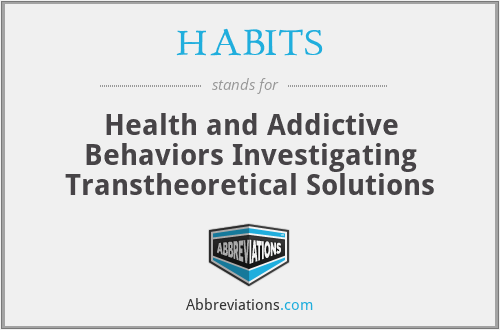What does HABITS mean in Healthcare?
This page is about the meanings of the acronym/abbreviation/shorthand HABITS in the Medical field in general and in the Healthcare terminology in particular.
Health and Addictive Behaviors Investigating Transtheoretical Solutions
Submitted by S4Bot on February 1, 2019
Translation
Find a translation for Health and Addictive Behaviors Investigating Transtheoretical Solutions in other languages:
Select another language:
- - Select -
- 简体中文 (Chinese - Simplified)
- 繁體中文 (Chinese - Traditional)
- Español (Spanish)
- Esperanto (Esperanto)
- 日本語 (Japanese)
- Português (Portuguese)
- Deutsch (German)
- العربية (Arabic)
- Français (French)
- Русский (Russian)
- ಕನ್ನಡ (Kannada)
- 한국어 (Korean)
- עברית (Hebrew)
- Gaeilge (Irish)
- Українська (Ukrainian)
- اردو (Urdu)
- Magyar (Hungarian)
- मानक हिन्दी (Hindi)
- Indonesia (Indonesian)
- Italiano (Italian)
- தமிழ் (Tamil)
- Türkçe (Turkish)
- తెలుగు (Telugu)
- ภาษาไทย (Thai)
- Tiếng Việt (Vietnamese)
- Čeština (Czech)
- Polski (Polish)
- Bahasa Indonesia (Indonesian)
- Românește (Romanian)
- Nederlands (Dutch)
- Ελληνικά (Greek)
- Latinum (Latin)
- Svenska (Swedish)
- Dansk (Danish)
- Suomi (Finnish)
- فارسی (Persian)
- ייִדיש (Yiddish)
- հայերեն (Armenian)
- Norsk (Norwegian)
- English (English)
Definition
What does HABITS mean?
- habits
- A habit (or wont as a humorous and formal term) is a routine of behavior that is repeated regularly and tends to occur subconsciously.The American Journal of Psychology (1903) defined a "habit, from the standpoint of psychology, [as] a more or less fixed way of thinking, willing, or feeling acquired through previous repetition of a mental experience." Habitual behavior often goes unnoticed in persons exhibiting it, because a person does not need to engage in self-analysis when undertaking routine tasks. Habits are sometimes compulsory. A 2002 daily experience study by habit researcher Wendy Wood and her colleagues found that approximately 43% of daily behaviors are performed out of habit. New behaviours can become automatic through the process of habit formation. Old habits are hard to break and new habits are hard to form because the behavioural patterns which humans repeat become imprinted in neural pathways, but it is possible to form new habits through repetition.When behaviors are repeated in a consistent context, there is an incremental increase in the link between the context and the action. This increases the automaticity of the behavior in that context. Features of an automatic behavior are all or some of: efficiency; lack of awareness; unintentionality; and uncontrollability.
Embed
Citation
Use the citation below to add this abbreviation to your bibliography:
Style:MLAChicagoAPA
"HABITS." Abbreviations.com. STANDS4 LLC, 2024. Web. 26 Apr. 2024. <https://www.abbreviations.com/term/2041523>.



Discuss this HABITS abbreviation with the community:
Report Comment
We're doing our best to make sure our content is useful, accurate and safe.
If by any chance you spot an inappropriate comment while navigating through our website please use this form to let us know, and we'll take care of it shortly.
Attachment
You need to be logged in to favorite.
Log In